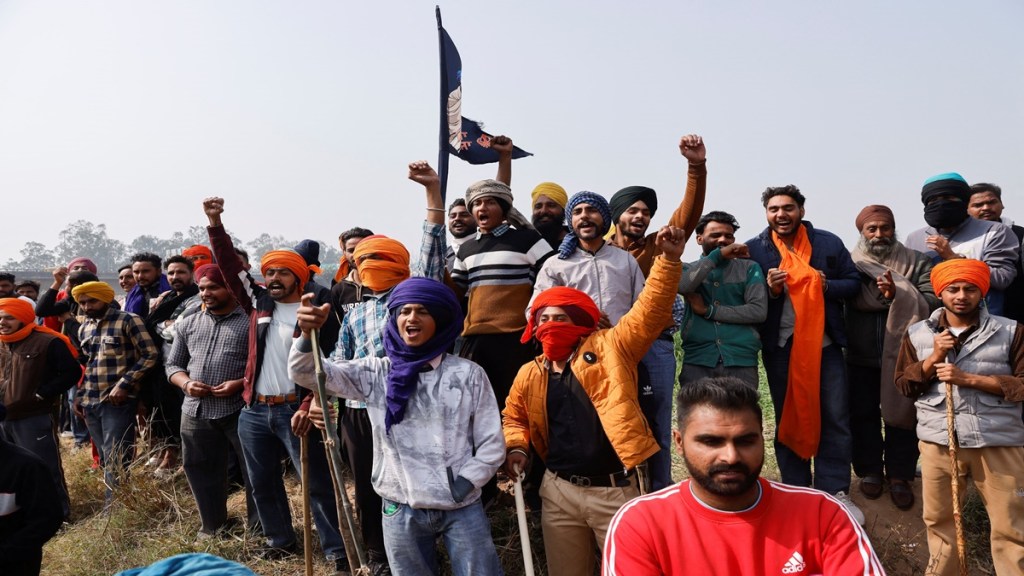The agitating farmers on Monday rejected the Centre’s proposal to procure pulses, maize, and cotton at MSP by government agencies for five years, stating that it was ‘not in farmers’ interest’ and said they will resume their ‘Delhi Chalo’ march toward the national capital on Wednesday, February 21.
Sarwan Singh Pandher, leader of the Kisan Mazdoor Morcha, addressed reporters, stating, “We appeal to the government to either resolve our issues or remove barricades and allow us to proceed to Delhi to protest peacefully.”
Also Read:Farmers reject Modi govt’s MSP offer, to resume ‘Delhi Chalo’ protests from February 21
In the fourth round of talks with farmer leaders, a panel of three Union ministers on Sunday proposed the government’s plan to purchase pulses, maize, and cotton crops at MSP for five years, contingent on an agreement with farmers.
On Monday, the Samyukta Kisan Morcha, the driving force behind the 2020-21 farmers’ stir, rebuffed the government’s proposal, asserting that it sought to “divert and dilute” the farmers’ demand for MSP. They declared their unwavering commitment to nothing less than the ‘C-2 plus 50 per cent’ formula for MSP, as recommended in the Swaminathan Commission report.
Also Read:Farmers Protest Live Updates
Here’s why farmers rejected the Centre’s five-year proposal:
Lack of legal guarantee for MSP:
- Farmer leaders expressed that the government’s proposal did not incorporate a legal guarantee for Minimum Support Price (MSP). This absence raised concerns among farmers about the ongoing vulnerability of their income, with fears of potential exploitation without a firm assurance on MSP.
Inadequate benefits for farmers:
- According to Jagjit Singh Dallewal, the leader of a farmer forum, a thorough analysis of the government’s proposal revealed its lack of substantial benefits for farmers. The proposal failed to address the broader concerns and demands put forth by the farming community.
Demand for discussion and permission to march:
- In response to the government’s apparent reluctance to engage in meaningful discussions, farmer leaders expressed the need for a resolution through dialogue. When the government did not seem open to this, the farmers insisted on being allowed to march towards Delhi. Farmer leader Sarwan Singh Pandher stated, “The intention of the government was very clear that they would not let us enter Delhi at any cost… If you don’t want to find a solution through discussion with farmers, then we should be allowed to march towards Delhi… When we moved towards Delhi, shelling happened… Bullets were also used on the tyres of the tractors.”
Importance of MSP over other proposals:
- The rejection was based on the argument that the government’s priorities, such as importing palm oil, did not align with the needs of the farmers. Farmer leaders proposed that the money spent on such imports could be redirected towards supporting farmers in growing oilseed crops, thereby enhancing domestic production.
Use of force and violence:
- The farmers expressed dissatisfaction with the government’s approach during their march towards Delhi. They claimed that shelling and the use of bullets on tractor tyres indicated a lack of willingness to engage in peaceful dialogue. This, coupled with the demand for punishment for those using force, further exacerbated the distrust between the farmers and the government.
Perceived lack of genuine discussion:
- Farmer leaders argued that the government’s proposal was an attempt to divert attention from the core issues raised by the farmers. The rejection implied a perception among farmers that the government was not genuinely interested in resolving the crisis through meaningful discussions.
What farmers are demanding?
Farmers from Punjab, who commenced their march towards Delhi on February 13 but were halted by security forces at Shambhu and Khanauri points on the Punjab-Haryana border, are protesting to press the Centre to meet their demands. These include the implementation of the Swaminathan Commission’s recommendations, the provision of pensions for farmers and labourers, debt forgiveness for farmers, prevention of an increase in electricity charges, withdrawal of police cases, seeking justice for the victims of the 2021 Lakhimpur Kheri violence, reinstatement of the Land Acquisition Act of 2013, and compensation for the families of farmers who lost their lives during the previous protest in 2020-21.

